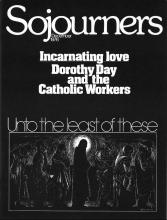For a long time I looked for a way out of the polarization of opinion about abortion. Finding a way out was particularly important to me because I have had a foot in both camps: I agreed with one side that criminal legal sanctions against abortion should be repealed, but also with the other that unborn life was human and should be treated as such.
With the air full of brickbats flying from both directions, this has been a difficult stance to maintain. Yet I have stuck to it, not only because it was what I honestly felt, but also because the search it gave rise to has been a religious one.
My understanding of the Christian message, as I have encountered it in the Bible, is that its central declaration is one of reconciliation -- of God with people and of people with each other. This reconciliation is both a fact and a call. Christians are directed both to announce it and to exhibit it in “the world,” in the situations of their lives. The imperative of holding out reconciliation applies especially to situations of conflict.
For me, this call sounded insistently in the abortion controversy. I could feel at least partial accord with those on both sides, yet I was pulled apart by their mutual antipathy. Thus it was a matter of faith as well as opinion to feel that, despite all the acrimony, this conflict was not inherent in the situation.
About a year ago in St. Louis, at a meeting on abortion and related issues, an idea began to take shape. I call it the “St. Louis Proposal,” and cherish the hope that it might point the way toward breaking out of this impasse.
Read the Full Article

